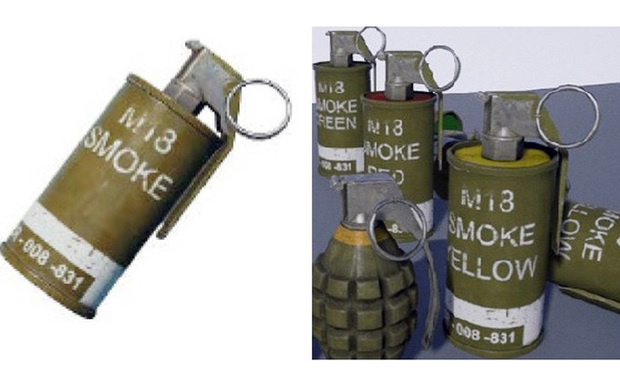IP Grenades Flying in Video Game Fight
Attorneys for the makers of "Rules of Survival" say the copyright suit filed against them is based in part on publicly available stock art.
November 02, 2018 at 03:46 PM
3 minute read
 Virtual smoke grenades depicted in the PUBG complaint (left) and on Unreal Engine Marketplace.
Virtual smoke grenades depicted in the PUBG complaint (left) and on Unreal Engine Marketplace.
An IP battle between two video game makers is growing more hostile as U.S. District Judge Jeffrey White of the Northern District of California mulls a motion to dismiss the case.
NetEase, the maker of “Rules of Survival,” asked White to postpone ruling Tuesday while it prepares a Rule 11 motion for sanctions against PUBG Corp, maker of “PlayerUnknown's Battlegrounds.”
NetEase's Quinn Emanuel Urquhart & Sullivan counsel said it had discovered that some game elements PUBG considers uniquely creative are actually clip art marketed by third parties. And PUBG's claim that NetEase ripped off its catch phrase “Winner Winner Chicken Dinner” is a “false allegation,” according to the motion, which is signed by Quinn Emanuel partner Claude Stern.
PUBG v. NetEase is being closely watched in the video game industry. It's a rare showdown between makers of two blockbuster games, and has the potential to shape copyright law for a lucrative young industry.
➤➤ Get IP news and commentary straight to your inbox with Scott Graham's Skilled in the Art. Sign up here.
PUBG sued NetEase in April, accusing it of copying numerous aspects of “Battlegrounds,” including the virtual weaponry players use to mow each other down. “The visual appearances of the weapons are realistic, but each weapon has been stylized to make it distinct from actual real life weapons,” PUBG states in its complaint.
NetEase's Tuesday filing highlights several weapons and consumables pictured in PUBG's complaint that appear to be identical—sometimes down to the serial number—of stock art that's publicly available on the Unreal Engine Marketplace. “PUBG cannot allege a copyright claim based on art it neither owns nor has an exclusive license to,” Stern writes.
Stern acknowledged that it was too soon for NetEase to bring an actual Rule 11 motion alleging the failure to perform an adequate investigation. Parties must give their opponents 21 days to cure the problems, and that period had not run as of Tuesday, Stern wrote. But a Rule 11 motion will be brought “promptly” if PUBG doesn't amend its complaint and identify all materials that came from third parties, he warned.
PUBG has not formally responded. But in email correspondence attached to the NetEase motion, Sidley Austin partner Rollin Ransom tells the Quinn attorneys there's no basis for Rule 11. He describes NetEase's filing as an improper end-around Rule 11, which precludes such motions from being “filed or presented to the court” until the 21 days have run.
“If you are sincerely interested in conferring respecting NetEase's claimed concerns, please advise as to the specific amendments you believe are necessary, so that the parties can have a meaningful discussion,” Ransom wrote.
On Wednesday, White issued a brief order neither granting nor denying the stay, but instead ordering the parties to meet and confer face-to-face or by telephone, not over email.
This content has been archived. It is available through our partners, LexisNexis® and Bloomberg Law.
To view this content, please continue to their sites.
Not a Lexis Subscriber?
Subscribe Now
Not a Bloomberg Law Subscriber?
Subscribe Now
NOT FOR REPRINT
© 2025 ALM Global, LLC, All Rights Reserved. Request academic re-use from www.copyright.com. All other uses, submit a request to [email protected]. For more information visit Asset & Logo Licensing.
You Might Like
View All
Buchalter Hires Longtime Sheppard Mullin Real Estate Partner as Practice Chair

Reality TV Couple and Pacific Palisades Neighbors Sue City of Los Angeles Over Loss of Homes to Fire
3 minute read
In Resolved Lawsuit, Jim Walden Alleged 'Retaliatory' Silencing by X of His Personal Social Media Account

No Two Wildfires Alike: Lawyers Take Different Legal Strategies in California
5 minute readTrending Stories
- 1OCR Issues 'Dear Colleagues' Letter Regarding AI in Medicine
- 2Corporate Litigator Joins BakerHostetler From Fish & Richardson
- 3E-Discovery Provider Casepoint Merges With Government Software Company OPEXUS
- 4How I Made Partner: 'Focus on Being the Best Advocate for Clients,' Says Lauren Reichardt of Cooley
- 5People in the News—Jan. 27, 2025—Barley Snyder
Who Got The Work
J. Brugh Lower of Gibbons has entered an appearance for industrial equipment supplier Devco Corporation in a pending trademark infringement lawsuit. The suit, accusing the defendant of selling knock-off Graco products, was filed Dec. 18 in New Jersey District Court by Rivkin Radler on behalf of Graco Inc. and Graco Minnesota. The case, assigned to U.S. District Judge Zahid N. Quraishi, is 3:24-cv-11294, Graco Inc. et al v. Devco Corporation.
Who Got The Work
Rebecca Maller-Stein and Kent A. Yalowitz of Arnold & Porter Kaye Scholer have entered their appearances for Hanaco Venture Capital and its executives, Lior Prosor and David Frankel, in a pending securities lawsuit. The action, filed on Dec. 24 in New York Southern District Court by Zell, Aron & Co. on behalf of Goldeneye Advisors, accuses the defendants of negligently and fraudulently managing the plaintiff's $1 million investment. The case, assigned to U.S. District Judge Vernon S. Broderick, is 1:24-cv-09918, Goldeneye Advisors, LLC v. Hanaco Venture Capital, Ltd. et al.
Who Got The Work
Attorneys from A&O Shearman has stepped in as defense counsel for Toronto-Dominion Bank and other defendants in a pending securities class action. The suit, filed Dec. 11 in New York Southern District Court by Bleichmar Fonti & Auld, accuses the defendants of concealing the bank's 'pervasive' deficiencies in regards to its compliance with the Bank Secrecy Act and the quality of its anti-money laundering controls. The case, assigned to U.S. District Judge Arun Subramanian, is 1:24-cv-09445, Gonzalez v. The Toronto-Dominion Bank et al.
Who Got The Work
Crown Castle International, a Pennsylvania company providing shared communications infrastructure, has turned to Luke D. Wolf of Gordon Rees Scully Mansukhani to fend off a pending breach-of-contract lawsuit. The court action, filed Nov. 25 in Michigan Eastern District Court by Hooper Hathaway PC on behalf of The Town Residences LLC, accuses Crown Castle of failing to transfer approximately $30,000 in utility payments from T-Mobile in breach of a roof-top lease and assignment agreement. The case, assigned to U.S. District Judge Susan K. Declercq, is 2:24-cv-13131, The Town Residences LLC v. T-Mobile US, Inc. et al.
Who Got The Work
Wilfred P. Coronato and Daniel M. Schwartz of McCarter & English have stepped in as defense counsel to Electrolux Home Products Inc. in a pending product liability lawsuit. The court action, filed Nov. 26 in New York Eastern District Court by Poulos Lopiccolo PC and Nagel Rice LLP on behalf of David Stern, alleges that the defendant's refrigerators’ drawers and shelving repeatedly break and fall apart within months after purchase. The case, assigned to U.S. District Judge Joan M. Azrack, is 2:24-cv-08204, Stern v. Electrolux Home Products, Inc.
Featured Firms
Law Offices of Gary Martin Hays & Associates, P.C.
(470) 294-1674
Law Offices of Mark E. Salomone
(857) 444-6468
Smith & Hassler
(713) 739-1250






